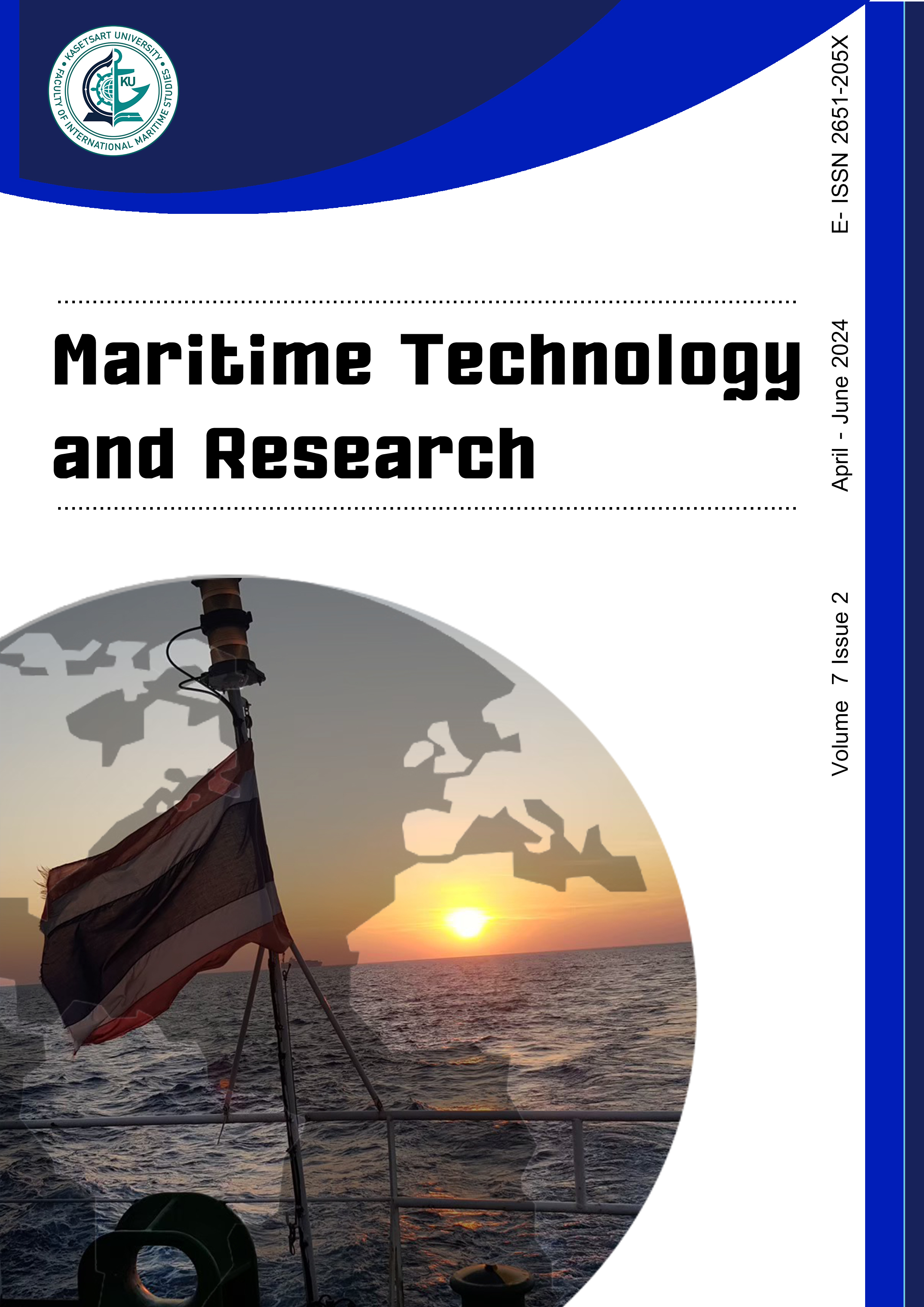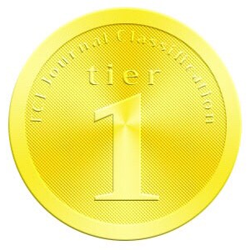Maritime security and blue economy development in Nigeria: A structural equation model
DOI:
https://doi.org/10.33175/mtr.2025.272954Keywords:
Maritime security; Blue Economy; Piracy; Oil theft; Gulf of GuineaAbstract
The Nigerian Niger Delta region has been described as the epicenter of piracy and kidnapping for ransom of seafarers and other maritime crimes, especially in the Gulf of Guinea region. This paper aims to evaluate maritime security and blue economy development in Nigeria using structural equation modelling. The study adopts a quantitative research methodology and expost facto research design. 33 year (1990 - 2022) time series secondary data are sourced from the International Maritime Bureau (IMB), Nigerian Ports Authority annual reports, CBN statistical bulletin, NOSDRA, and NPA annual statistics. The data obtained are transformed, cleaned, and subjected to confirmatory factor analysis, measurement modelling and structural equation modelling using AMOS (V23). From the structural equations analysis, the specified models meet the minimum/necessary conditions (Df => 0) for model identification. The findings of the study reveal that 56 % of maritime security threats in Nigeria waters can be predicted by the number of crewmen kidnapped for ransom, 55 % by pirates’ attacks, and 92 % by crude oil theft in Nigerian waters. Similarly, the results reveal that maritime security threats (MST) have a significant effect on blue economy development in Nigeria. Imperatively, adequate maritime security measures stimulate confidence among local and international stakeholders, attracting investments, encouraging trade partnerships, and enhancing the country’s position as a reliable maritime hub. Therefore, the study recommends that the Nigerian government should prioritize cooperation and collaboration with other regional navies to ensure adequate maritime domain awareness and security interdiction within her exclusive economic zone, as provided by the Yaoundé code of conduct security architecture.
------------------------------------------------------------------------------
Cite this article:
APA Style:
Uchenna, E.M., Onyemechi, C., Emeaghara, G.C., Nze, I.C., & Ndikom, O. (2025). Maritime security and blue economy development in Nigeria: A structural equation model. Maritime Technology and Research, 7(2), 272954. https://doi.org/10.33175/mtr.2025.272954
MDPI Style:
Uchenna, E.M.; Onyemechi, C.; Emeaghara, G.C.; Nze, I.C.; Ndikom, O. Maritime security and blue economy development in Nigeria: A structural equation model. Marit. Technol. Res. 2025, 7(2), 272954. https://doi.org/10.33175/mtr.2025.272954
Vancouver Style:
Uchenna EM, Onyemechi C, Emeaghara GC, Nze IC, Ndikom, O. (2025). Maritime security and blue economy development in Nigeria: A structural equation model. Marit. Technol. Res. 7(2): 272954. https://doi.org/10.33175/mtr.2025.272954
------------------------------------------------------------------------------
Highlights
- Nigerian government should prioritise cooperation and collaborations with other regional navies to ensure adequate maritime domain awareness and security interdiction.
- Maritime security threats (MST) have a significant effect on blue economy development in Nigeria.
- The locals’ resort to low-risk high reward criminal ventures at sea to eke a living.
- The Blue Economy discourse is based on the triumvirate pillars of economic growth, environmental sustainability, and social inclusion.
References
African Union. (2012). 2050 Africa’s integrated maritime strategy, version 1.0. African Union.
African Union. (2016). African charter on maritime security and safety and development in Africa (Lomé Charter). Retrieved from https://au.int/en/treaties/african-charter-maritime-security-and-safety-and-development-africa-lome-charter
African Union-InterAfrican Bureau for Animal Resources. (2019). Africa blue economy strategy. Nairobi, Kenya.
Atakpa, S. D. (2021). Marine protected area: A fundamental component of the blue economy. Retrieved from https://www.researchgate.net/publication/351118154
Belhabib, D., Sumaila, U. R., & Le, P. (2018). The fisheries of Africa: Exploitation, policy, and maritime security trends. Marine Policy, 101, 80-92. https://doi.org/10.1016/j.marpol.2018.12.021
CEMLAWS Africa. (2021). Gulf of Guinea: Piracy-Graphics 2020, Maritime Governance Brief. Retrieved from https://www.cemlawsafrica.com/wp-content/uploads/2021/04/CEMLAWSAFRICA_Gulf_of_Guinea_Piracygraphics_20
Colgan, C. S. (2016). Mearsurement of the ocean economy from national income accounts to the sustainable blue economy. Journal of Ocean and Coastal Economies, 2(2), 12. https://doi.org/10.15351/2373-8456.1061
Fan, Y., Chen, J., Shirkey, G., John, R., Wu, S. R., Park, H., & Shao, C. (2016). Applications of structural equation modelling (SEM) in ecological studies: an updated review. Ecological Processes. https://doi.org/10.1186/s13717-016-0063-3
Groff, E. R. (2008). Adding the temporal and spatial aspects of routine activities: A further test of routine activity theory. Security Journal, 21, 99 -116. https://doi.org/10.1057/palgrave.sj.8350070
Guenther, P., Guenther, M., Ringle, C. M., Zaefarian, G., & Catwright, S. (2023). Improving PLS-SEM use for business marketing research. Industrial Marketing Management, 111, 127-142. https://doi.org/10.1016/j.indmarman.2023.03.010
Gutierrez, M., Daniels, A., & Jobbins, G. (2018). Fishing for data the role of private data platforms in addressing illegal fishing. Shaping policy for development. Retrieved from http://dx.doi.org/10.13140/RG.2.2.18575.07841
Hamisu, A. H. (2019). A study of Nigeria’s blue economy potential with particular reference to the oil and gas sector. World Maritime University Dissertations. Retrieved from https://commons.wmu.se/all_dissertations/1234
Keter, J. K. (2022). An evaluation of maritime security strategies in promoting blue economy in the coastal region: A case study of Mombasa County, Kenya. International Journal of Research and Innovation in Social Sciences, VI(IX), 430-439.
Kigerl, A. (2012). Routine activity theory and the determinants of high cybercrime countries. Social Science Computer Review, 30(4), 470-486. https://doi.org/10.1177/0894439311422689
Kleemans, E. R., Soudijn, M. R. J., & Weenink, A. W. (2012). Organized crime, situational crime prevention and routine activity theory. Trends in Organized Crime Journal, 15, 87-92. https://doi.org/10.1007/s12117-012-9173-1
Kline, R. B. (2016). Principles and practice of structural equation modeling (4th ed.). New York: The Guilford Press.
Kyari, M. (2019). Piracy in the Gulf of Guinea, issues, challenges for international trade, national security & sustainable development of member states. Retrieved from https://thewhistler.ng/n230-2bn-lost-to-oil-theft-in-2019-nnpc
Lam, V., Cheung, W., Swartz, W., & Sumaila, U. (2012). Climate change impacts on fisheries in West Africa: Implications for economic, food and nutritional security. African Journal of Marine Science, 34(1), 103-117. https://doi.org/10.2989/1814232X.2012.673294
Naanen, B. (2019). The extractive industries and society when extractive governance fails: Oil theft as resistance in Nigeria. The Extractive Industries and Society, 6(3), 702-710. https://doi.org/10.1016/j.exis.2019.03.019
NATO Southern Hub. (2021). Maritime security in the Gulf of Guinea - Webinar report, NATO Strategic Direction- South Hub. Retrieved from https://thesouthernhub.org/topics/security-conflict/report-on-webinar-maritime-security-in-the-gulf-ofguinea.aspx?tagf=Police%20&%20Governance?tagf=Police%20&%20Governance
Neethling, T. (2010). Piracy around Africa’s West and East Coasts: A comparative political perspective. Scientia Militaria, South African Journal of Military Studies, 38(2), 90-105. https://doi.org/10.5787/38-2-91
Ngada, T., & Bowers, K. (2018). Spatial and temporal analysis of crude oil theft in the Niger delta. Security Journal, 31, 501-523. https://doi.org/10.1057/s41284-017-0112-3
Nze, I. C., Ogwude, I. C., Nnadi, K. U., & Ibe, C. C. (2016). Cost optimisation models of port operations in Nigeria: A scenario for emerging river ports. Journal of Maritime Research, 13(3), 39-46.
Oceans Beyond Piracy. (2018). The state of maritime piracy: Assessing the human costs: A report. One Earth Future, Broomfield, USA.
Okafor-Yarwood, I. (2019). Illegal, unreported and unregulated fishing, and the complexities of the sustainable development goals (SDGs) for countries in the Gulf of Guinea. Marine Policy, 99, 414-422. https://doi.org/10.1016/j.marpol.2017.09.016
Okafor-Yarwood, I. (2020). The cyclical nature of maritime security threats: Illegal, unreported, and unregulated fishing as a threat to human and national security in the Gulf of Guinea. African Security, 13(2), 116-146. https://doi.org/10.1080/19392206.2020.1724432
Okafor-Yarwood, I., & Belhabib, D. (2019). The duplicity of the european union common fisheries policy in third countries: Evidence from the Gulf of Guinea. Ocean and Coastal Management, 184, 104953. https://doi.org/10.1016/j.ocecoaman.2019.104953
Olaoye, D. D., Owolabi, H. O., & Ayandele, J. K. (2020). A systematic review of structural equation model (SEM). Open Journal of Educational Development, 1(2), 27-39. https://doi.org/10.52417/ojed.v1i2.163
Oluniyi, A. E. (2017). Nigeria’s oil and gas production and Niger delta militant: The need of oil resource to stop oil reliance for sustainable development. Global Journal of Human-Social Science, 17(5), 23-33.
Onuoha, F. C., Scroll, P., & For, D. (2013). Piracy and maritime security in the Gulf of Guinea: Trends, concerns, and propositions. Journal of the Middle East and Africa, 4(3), 267-293. https://doi.org/10.1080/21520844.2013.862767
Onwuegbuchunam, D. E., Aponjolosun, M. O., Igboanusi, C., & Okeke, K. O. (2021). Maritime security regimes and impacts on Nigerian seaports. Open Journal of Safety Science and Technology, 11, 158-170. https://doi.org/10.4236/ojsst.2021.114011
Pichon, E., & Pietsch, M. (2019). Piracy and armed robbery off the coast of Africa: EU and Global Impact. European Parliament. https://doi.org/10.2861/78273
Pituch, K. A., & Stevens, J. P. (2016). Applied multivariate statistics for the social sciences (6th ed.). New York: Routledge. https://doi.org/10.4324/9781315814919
Pretorius, R. & Henwood, R. (2020). Governing Africa’s blue economy: The protection and utilisation of the continent’s blue spaces. Studia Universitatis Babeş-Bolyai. https://doi.org/10.24193/subbeuropaea.2019.2.05
RiskIntelligence. (2021). Gulf of guinea piracy: Threat analysis and trends. Whitepaper.
Russolillo, G., & Trinchera, L. (2019). An introduction to structural equation modelling. Retrieved from https://maths.cnam.fr/IMG/pdf/sem_sta201_cle02e742.pdf
Spamer, J. (2018). Blue economy: A new frontier of an African Renaissance? Retrieved from https://issblog.nl/2018/11/13/development-dialogue-2018-blue-economy-a-new-frontier-of-an-african-renaissance-by-johan-spamer
Stable Seas. (2019). Maritime security index: Codebook version 2.0. Stable Seas.
Sumaila, U. R., Zeller, D., Hood, L., Palomares, M. L. D., Li, Y., & Pauly, D. (2020). Illicit trade in marine fish catch and its effects on ecosystems and people worldwide. Science Advancement, 6(9), eaaz3801. https://doi.org/10.1126/sciadv.aaz3801
Tokulah-Oshoma, C. (2019). Piracy and armed robbery in the Gulf of Guinea and the suppression of piracy and other maritime related offences act (SUPMOA) 2019. Olisa Agbakoba Legal (OAL). Retrieved from https://oal.law/piracy-robbery-in-the-gulf-of-guinea-2019
Transparency International Defence and Security. (2019). Military involvement in the Niger Delta: A Discussion Paper. Transparency International Defence and Security.
United Nations Economic Commission for Africa. (2016). Africa’s blue economy: A policy handbook. United Nations Economic Commission for Africa, Addis Ababa, Ethiopia.
United Nations Office on Drug and Crime. (2021). Pirates of the Niger Delta: Between blue and brown waters. Global Maritime Crime Programme of United Nations Office on Drug and Crime.
United Nations. (2022). Making waves for a blue economy. United Nations. Retrieved from https://www.un.org/en/desa/making-waves-blue-economy
Voyer, M., Schofield, C., Azmi, K., Warner, R., Mcilgorm, A., & Quirk, G. (2018). Maritime security and the Blue Economy: Intersections and interdependencies in the Indian Ocean. Journal of the Indian Ocean Region, 14(1), 28-48. https://doi.org/10.1080/19480881.2018.1418155
World Bank. (2017). What is the blue economy? World Bank. Retrieved from https://www.worldbank.org/en/news/infographic/2017/06/06/ blue-economy
Yorulmaz, O. (2016). Marine insurance and piracy. Retrieved from https://www.researchgate.net/publication/311762118_Marine_Insurance_and_Piracy/link/585947b608ae64cb3d493945/download?_tp=eyJjb250ZXh0Ijp7InBhZ2UiOiJwdWJsaWNhdGlvbiIsInByZXZpb3VzUGFnZSI6bnVsbH19, Accessed 12/08/2024
Downloads
Published
Issue
Section
License
Copyright (c) 2024 Maritime Technology and Research

This work is licensed under a Creative Commons Attribution-NonCommercial-NoDerivatives 4.0 International License.
Copyright: CC BY-NC-ND 4.0








